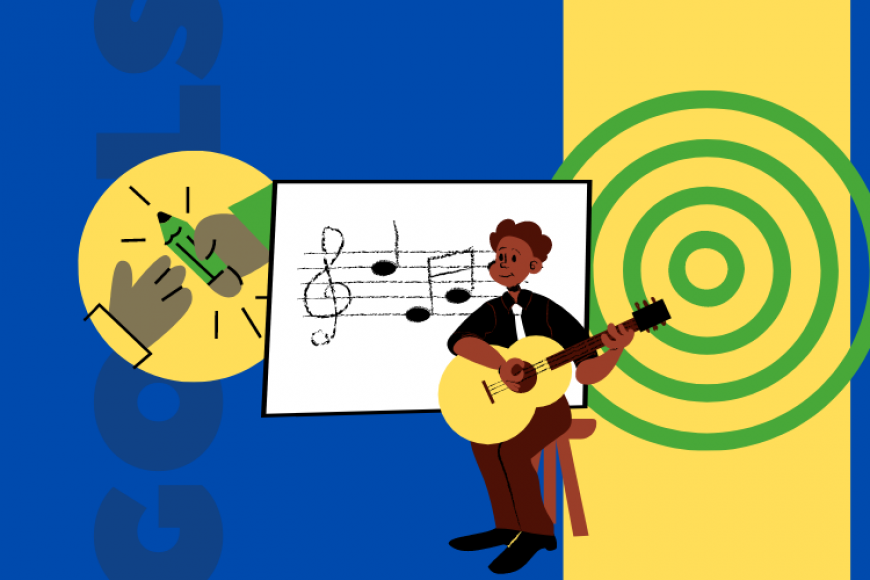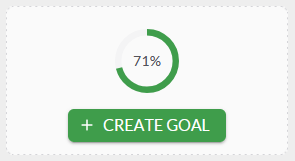How To Achieve Your New Year’s Music Goals

If you’ve got big plans for music in 2023, here’s how to make sure your resolutions pan out like you want.
1. Set Your Goals Correctly
The way you define your goals determines whether or not you can achieve them. Goals that are too lofty or vague end up abandoned. Many musicians (teachers, coaches, entrepreneurs, etc.) recommend setting SMART goals. SMART is an acronym designed to remind you of the keys to successful goal-setting. It stands for Specific, Measurable, Attainable, Realistic, and Timely. Here are some examples:
S – Specific. Be detailed with your wording and establish a specific task.
Prospective beginner music student:
Too vague - ‘Learn guitar.’ What style of guitar do you want to learn? How will you learn guitar — by ear, from YouTube videos, in private lessons?
Specific - ‘Take five lessons in classical guitar and five lessons in fingerstyle guitar. Explore beginner repertoire and decide which I like better for further lessons.’
M – Measurable. You need to know when your goal is achieved. 
Long-term goals for an intermediate electric guitarist:
Not measurable - ‘Become a good lead guitarist.’ How do you know when you’re good? What does it mean to be good? Who decides when you’re good?
Measurable - ‘Form a band with three of my friends, learn an hour-long set of our favorite songs, play lead guitar in at least half the songs, and write at least two original solos.’
A – Attainable. Set goals that are attainable for your experience level. It’s good to have hopes and dreams for further down the road, but SMART goals are ones you can begin right now.
Classical guitarist who has been playing for ten months:
Unattainable - ‘Learn Bach’s Fugue in A Minor’. This is a long and challenging piece. Even advanced players would want several months to learn it well.
Attainable - ‘Learn Bach’s Bourree in A Major.’ This is a short, 16-measure piece appropriate for intermediate beginners.
R – Realistic. Take into account the amount of time you have to dedicate to your goal.
For an intermediate-beginner guitarist during a 20-minute practice session:
Unrealistic - ‘Learn Bach’s Bourree in A Major.’ This is too big a task to accomplish in 20 minutes. Break it up into smaller tasks that you can achieve in the time you have.
Realistic- ‘Decide on and write in right hand fingerings for Bourree in A Major.’ For the following 20-minute practice session the goal might be ‘Learn the first 4 measures with the correct right-hand fingerings at a tempo of 40 beats per minute.’
Here’s another example for an adult who can dedicate three hours per week to the guitar:
Unrealistic - ‘Prepare an hour-long recital to play for my family and friends.’ An hour’s worth of music is too much to get under your fingers and maintain on three hours per week.
Realistic - ‘Learn two songs from memory and perform them for family and friends.’ Six to ten minutes worth of music is a reasonable amount to learn on three hours per week of practice.
T – Timely. Set a deadline.
When will you achieve this goal? The deadline can be the end of your next practice session, by Friday, March 31st, or the end of 2023. The important thing is that the deadline is appropriate for the goal. If you set a big long-term goal, expect to break it down into many shorter term goals with closer deadlines.
2. Track Your Progress
· Keep a practice journal. Each time you sit down to practice, define what you plan to accomplish in that session. Even single-session goals should be SMART. After your practice session, record how long you practiced, what you accomplished, what you didn’t, and how you felt.
Lessonface has free downloadable and printable music practice log templates for children and a free downloadable and printable practice journal for adults to help jumpstart your journaling habit.
· Record yourself frequently. Casual audio recordings on your phone give you immediate feedback on how you’re progressing from one week to the next. Periodic video recordings are a big help too. Save your recordings, because it’s deeply rewarding to hear your progress over the years. Teacher Victoria Witmer goes into more detail on how and why to record yourself here .
3. Hold Yourself Accountable.
· Better yet, share your goals with your teacher so that they can hold you accountable, too. Lessonface has a new goal-setting app that guides you in setting goals and tracking your progress. You can share select goals with your teacher so that they know what you aim to accomplish. Knowing that your teacher will be expecting you to complete your weekly tasks is a great motivator.
· You can find the goal-setting app in your left-hand menu bar under the Profile Heading, or, if you are already signed in, find the goal-setting app here.
4. Keep it Fun
· Base your goals around music you love and genuinely want to learn. Try not to set goals just because they sound neat and tidy and ‘good for you’. For example, there’s no need for most guitarists to learn every etude in Fernando Sor’s Complete Studies for the Guitar. Listen to recordings and select the etudes that you enjoy listening to. If you need to work on specific techniques that those etudes don’t address, consider studies by a different composer rather than forcing yourself to check all the boxes on an arbitrary goal.
· Focused practice is hard work and takes a lot of concentration and energy. It’s sure to produce gratifying results. But let yourself play around and have fun aimlessly, too. This can be whatever you want - improvising, playing along with recordings, learning silly songs that don’t particularly challenge you. If you’re not enjoying playing your instrument, you’re missing the point.
· Keeping it fun is particularly critical for young learners. Lessonface teachers Esther Howard and Elizabeth Turner offer advice for keeping your young musicians engaged and excited about their music lessons.
Read about Nurturing Your Child’s Motivation for Music Lessons and Developing Joy in Music Lessons for Children.
Students, check out the goal-setting app and let us know what you think! Be sure to share some goals with your teacher so they can help hold you accountable.
Do you have more tips for fulfilling your 2023 resolutions in music? Please add them below!
Happy New Year!
Leah
Article originally published in 2021; updated for the new year in 2023!





Comments
Julieta Pizarro
Fri, 02/03/2023 - 11:21am EST
Permalink
great!
great!